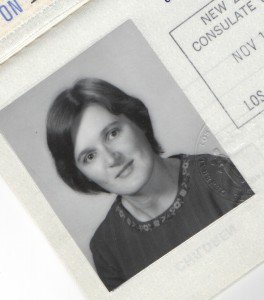Fight or flight: an expatriate ponders
 Since the election, my husband has been suggesting that we renew our New Zealand passports, expired nearly forty years. Though we are fortunate in having dual citizenship, I am reluctant. I love my life and my friends here in Northern California, and want to stay and fight for what I value. “It’s just an insurance,” he says. Just in case the unthinkable happens.
Since the election, my husband has been suggesting that we renew our New Zealand passports, expired nearly forty years. Though we are fortunate in having dual citizenship, I am reluctant. I love my life and my friends here in Northern California, and want to stay and fight for what I value. “It’s just an insurance,” he says. Just in case the unthinkable happens.
In this period of political unease in the US, when many have expressed a wish to go live somewhere else, I think back to our last few years in England in the mid-1960s, and how alienated we felt then.
An economics text for UK students cites several reasons for the dour mood of the country in those years. Author Tejvan Pettinger writes:
Despite higher economic growth, the UK performed relatively poorly compared to major competitors. UK productivity growth was relatively lower due to several factors. such as:
- Lack of willingness / ability to innovate
- Poor industrial relations with a growing number of days lost to strike action. Some argue this was exacerbated by Britain’s class system.
- Trade unions effectively blocked efforts at reform.
- Complacency.
- Lack of public sector infrastructure.
Even though we might have returned to New Zealand then, our lives did not take that turn. In my old black filing cabinet I found a letter to my parents that lays out the situation.
19 July 1966
… [W]e are still unsettled about what we are going to do with ourselves. We did have serious ideas of returning to New Zealand, but I am afraid that is now dropped through lack of interest on the part of N.Z. firms. We are feeling rather sour about the whole affair, especially as N.Z. is always griping about the country’s young brains staying away in their thousands. A year ago Tony made a private enquiry to I.C.T. (NZ) asking about the prospects of getting a job, and did not even get the courtesy of a reply. Then six months ago head office in London offered to arrange a transfer for him. After much prodding, official letters to N.Z. eventually got answered, but in such unsatisfactory terms that no-one knew quite what they wanted. It has taken six months for N.Z. to agree to take Tony, but they have made it plain that they consider he is being foisted on them by London, and that they are still suspicious of him. Their terms are that he is to have a year’s training in computer systems, and not until “they see how he gets on with the training” will they consider discussing position or salary. Since Tony is one of I.C.T.’s top authorities on computer tape, and already has a big general background in computer systems, he has taken this as a not-so-polite brush-off and told them what they can do with the job. If he were in his early twenties, without family, and determined to get back, it might have been different. But at his age—rising thirty is a critical age in his line of industry, since the job decisions he takes now will set the line his career is to take. So you see he just can’t afford to throw away yet another year on a job that might still not eventuate, and would probably be a frustrating backwater if it does. Other computer firms in N.Z. take much the same line—not interested enough to get him an interview in London, just “drop in when you get to N.Z. and we will see if there is anything doing.”
Meanwhile, he is still negotiating for a job with an American firm, which might mean going to live in California, but nothing has been settled yet, We feel it is time we got out of this country—the present economic crisis is just a symptom of a general decadence and backward-looking attitude, and we can’t see any future for Britain.
You mentioned your feelings towards Britain as a spiritual home—I can understand this, and think it is one of the main forces that pushes young people into coming over here. I think it is this thing about historical roots—it gives a wonderful sense of history and continuity to visit places that have been lived in for so long by so many different peoples. But it is necessary to distinguish between this feeling and the present political reality. Modern Britain doesn’t care two hoots about New Zealand—it is either confused with Australia (well, they are both on the other side of the world, what does it matter?) or else N.Z. is regarded as some sort of idealised paradise where it is never rainy or cold, and where they would like to go to escape from reality. As a political or economic entity it just doesn’t exist. And while N.Z.ers continue to believe that it doesn’t exist either, except as an offshoot of Britain, there is not much hope for its future, and the young brains will continue to stay away in their thousands.
Which makes us more or less permanent exiles, at least spiritually. But if we do go to America, it is probable that Tony will be earning enough money for us to afford the occasional holiday in N.Z. I feel very sad that the children do not yet know their grandparents, but that is one of the penalties of our decision. I hope you will understand.


Is the U.S. headed toward the England you described 56 years ago? People supporting Trump seems to want to go that way, feeling nostalgic for what they remember, except they don’t remember much.
We may move closer to a class system if the Republicans have their way. But maybe the planet is moving thru another cycle of dark age life? Like climate change?
Anyway, glad you and Tony ended up here, Maureen.
H.
Very interesting, and a reminder that immigrants of all stripe have so many factors affecting decisions where to live. So important that an autocrat doesn’t decide for them!